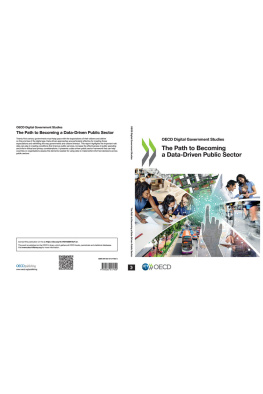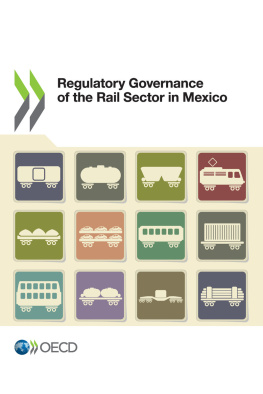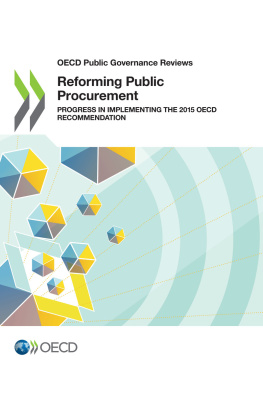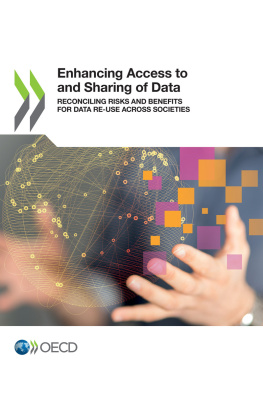OECD - The Path to Becoming a Data-Driven Public Sector
Here you can read online OECD - The Path to Becoming a Data-Driven Public Sector full text of the book (entire story) in english for free. Download pdf and epub, get meaning, cover and reviews about this ebook. year: 2019, publisher: OECD Publishing, genre: Politics. Description of the work, (preface) as well as reviews are available. Best literature library LitArk.com created for fans of good reading and offers a wide selection of genres:
Romance novel
Science fiction
Adventure
Detective
Science
History
Home and family
Prose
Art
Politics
Computer
Non-fiction
Religion
Business
Children
Humor
Choose a favorite category and find really read worthwhile books. Enjoy immersion in the world of imagination, feel the emotions of the characters or learn something new for yourself, make an fascinating discovery.
The Path to Becoming a Data-Driven Public Sector: summary, description and annotation
We offer to read an annotation, description, summary or preface (depends on what the author of the book "The Path to Becoming a Data-Driven Public Sector" wrote himself). If you haven't found the necessary information about the book — write in the comments, we will try to find it.
OECD: author's other books
Who wrote The Path to Becoming a Data-Driven Public Sector? Find out the surname, the name of the author of the book and a list of all author's works by series.
The Path to Becoming a Data-Driven Public Sector — read online for free the complete book (whole text) full work
Below is the text of the book, divided by pages. System saving the place of the last page read, allows you to conveniently read the book "The Path to Becoming a Data-Driven Public Sector" online for free, without having to search again every time where you left off. Put a bookmark, and you can go to the page where you finished reading at any time.
Font size:
Interval:
Bookmark:
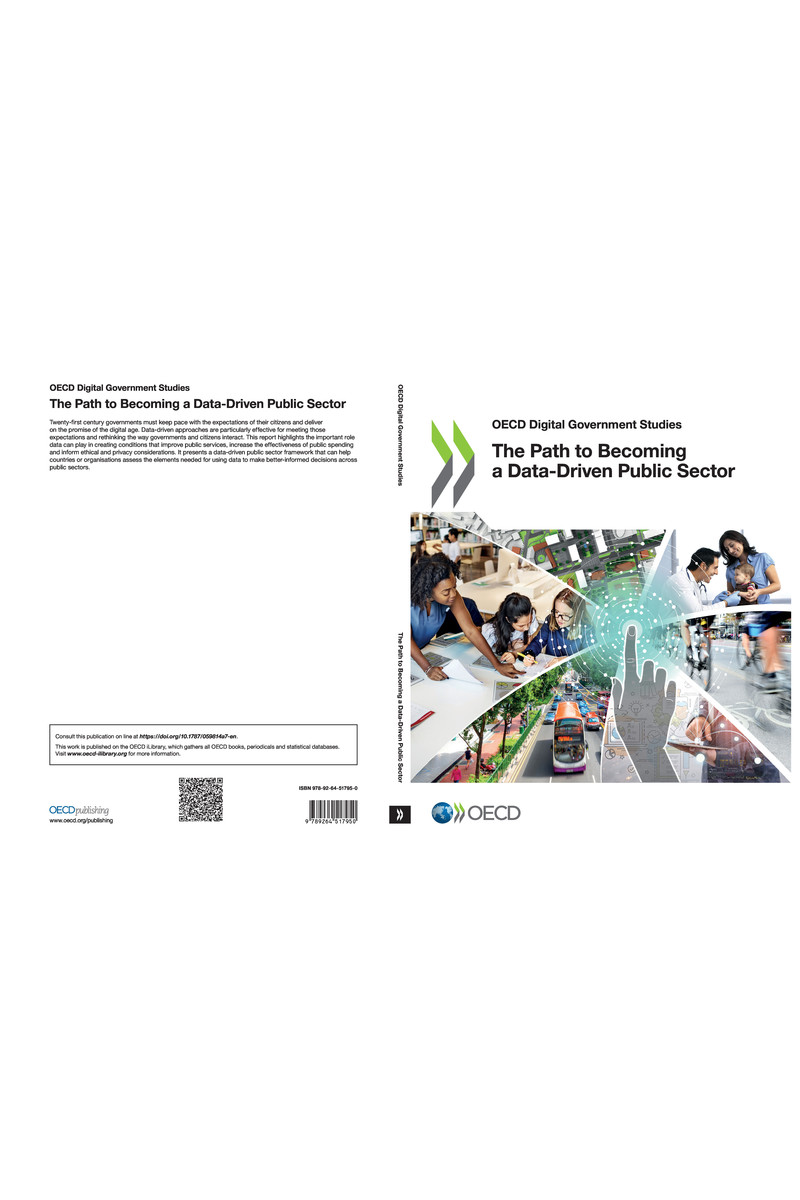
OECD (2019), The Path to Becoming a Data-Driven Public Sector , OECD Digital Government Studies, OECD Publishing, Paris, https://doi.org/10.1787/059814a7-en .
As rapid digital transformation changes all aspects of daily life, citizens expect their governments to provide better services and policies that deliver on the promises of the digital age. Advances in technology and data-driven approaches can radically change the way governments and citizens interact. Through a strategic use of data, governments can create conditions for improving the quality of public services, increasing the effectiveness of public spending and safeguarding ethical and privacy considerations. A data-driven public sector requires governance mechanisms that favour efficient data handling but also preserve public trust when using data to deliver outcomes.
The OECD is a long-standing advocate of a data-driven approach; the 2014 OECD Recommendation of the Council on Digital Government Strategies recognises the central importance of data in the shift to digital government. This report describes trends, opportunities and challenges for policy makers in the use of data as a strategic asset. It highlights country practices and provides guidance on applying data to improve the quality of public services and citizen well-being.
This report addresses three areas of discussion: the importance of data governance as the foundation of a data-driven public sector, the use of data to increase public value, and the role of data in building public trust.
Data governance underpins the readiness of the public sector to adopt data-driven approaches. Governments can then use data not only to anticipate the publics needs, but also to deliver better services, improve policy implementation and evaluate their own performance. Nevertheless, the increasing use of sensitive or personal data raises new challenges for governments. This report explores ongoing efforts to ensure ethical, transparent and secure ways of managing and handling data to support public trust.
The report is the culmination of OECD work on digital government and open government data, which seeks to support governments in using data to transform the public sector and address issues of public governance. This work is grounded in the 2014 OECD Recommendation and carried out under the auspices of the OECD Working Party of Senior Digital Government Officials. The report builds on the work of the Working Partys Thematic Group on the Data-Driven Public Sector, the OECD Working Paper A data-driven public sector , and the analysis from OECD Digital Government Reviews. Finally, it reflects the specific experiences of Denmark, Ireland, Korea, Portugal, Sweden and the United Kingdom.
This report, as document GOV/PGC(2019)50, was approved by the Public Governance Committee at its 60 th session on 15 November 2019, and was prepared for publication by the OECD Secretariat.
The data-driven public sector framework presented in this report can be used by countries or organisations to assess the different elements required for using data to make better-informed decisions across the public sector. It is not intended as a one-size-fits-all prescriptive model, but is offered as a tool to support the development of additional case studies to foster data-driven approaches in different policy areas.
This report was prepared by the OECD Directorate for Public Governance, under the leadership of Marcos Bonturi. It was produced by the OECD Reform of Public Sector Division, under the supervision of Barbara-Chiara Ubaldi, Acting Head of Division and Head of the Digital Transformation of the Public Sector work.
Chapters 1 and 3 were written by Benjamin Welby, Digital Government Policy Analyst. Chapter 2 was written by Jacob Arturo Rivera Perez, Digital Government and Open Data Policy Analyst. Chapter 4 was written by Lucia Chauvet, Junior Consultant. The case studies were written by Gavin Ugale with input from Dr. Michael Nest, consultant, on fraud in social benefits programmes, and research support by Alexis Bernigaud (Public Sector Integrity); and Seokhee Lee, Natalia Nolan Flecha and Daniel Gerson (Public Employment and Management). Piret Tonurist, Policy Analyst, Public Sector Innovation, and Cecilia Emilsson, Junior Consultant, contributed to Chapter 2.
The OECD Secretariat is also thankful to Bas Groenveld, Adviser on International Affairs, Dutch Ministry of the Interior and Kingdom Relations; Sam Roberts, Senior Policy Adviser, Data Policy Team, Department for Digital, Culture, Media and Sport, United Kingdom; Claire Chapman, Office for Artificial Intelligence, United Kingdom; and Harry Armstrong, Head of Technology Futures, Nesta, for the support provided for the finalisation of Chapter 2.
All chapters benefitted from the strategic orientation and revisions of Barbara-Chiara Ubaldi. Benjamin Welby served as the lead co-ordinator of the report. Colleagues from within the OECD, including Janos Bertok, Klas Klaas, Edwin Lau and Stphane Jacobzone, reviewed and provided comments. Editorial support was provided by Jennifer Allain and Liv Gaunt.
This report builds on the body of work produced by Jacob Arturo Rivera Perez, Reginald Dadzie and Cecilia Emilsson in the OECD Open Government Data Report, and the working paper on a A data-driven public sector written by Charlotte Van Ooijen, Barbara Ubaldi and Benjamin Welby. The OECD is also grateful for the early support of the governments of Denmark, Ireland, Korea, Portugal, Sweden and the United Kingdom; the comparative data collection referenced throughout this report was made possible by their contributions.
The OECD wishes to acknowledge the ongoing support of the OECD Working Party of Senior Digital Government Officials (E-Leaders) and the OECD Expert Group on Open Government Data to the data-driven public sector agenda, with particular thanks to the Data-driven Public Sector Thematic Group led by the Netherlands and benefitting from the input of Argentina, Chile, Colombia, Denmark, Egypt, Estonia, the European Commission, Israel, Italy, Latvia, Luxembourg, Panama, Portugal, Slovenia, Spain, the United Kingdom and Uruguay.
Font size:
Interval:
Bookmark:
Similar books «The Path to Becoming a Data-Driven Public Sector»
Look at similar books to The Path to Becoming a Data-Driven Public Sector. We have selected literature similar in name and meaning in the hope of providing readers with more options to find new, interesting, not yet read works.
Discussion, reviews of the book The Path to Becoming a Data-Driven Public Sector and just readers' own opinions. Leave your comments, write what you think about the work, its meaning or the main characters. Specify what exactly you liked and what you didn't like, and why you think so.

